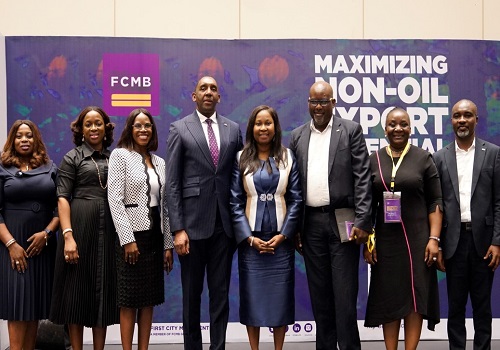

Nigeria’s vast non-oil endowment must be urgently leveraged to diversify and expand its revenue base, reduce the dependence on crude oil for foreign exchange earnings, and stimulate rapid economic growth.
Policymakers, financiers, export trade experts and value chain players insisted on this in Lagos at a non-oil export trade seminar organised by First City Monument Bank (FCMB).
Fifth in its series, the seminar with the theme “Refocusing Nigeria’s economic development through non-oil exports” was aimed to transform the non-oil sector into the primary driver of economic growth.
FCMB Managing Director Mrs Yemisi Edun, identified non-oil export as a catalyst for rapid economic growth.
She said it would reduce Nigeria’s vulnerability to external shocks undermining the economy. Mrs Edun affirmed FCMB’s commitment to the sector, especially opportunities in the African Continental Free Trade Area.
The Bank Chief commended the Central Bank and Bankers’ Committee for introducing the Road To $200 billion (RT200) to fast-track the diversification of the economy’s productive base through export. Mrs Edun disclosed that the programme increased foreign exchange inflow significantly by about $600 million in the first half of 2022.

ACEO of the Nigerian Export Promotion Council (NEPC), Ezra Yakusak, lauded the “Road To $200 billion (RT200) programme. He said it offers ample opportunities for operators in export trade to scale up. Mr Samuel Oyeyipo, Regional Director of the Council, represented Mr Yakusak at the Seminar.
According to the NEPC Boss, Nigeria’s abundant natural resources provide a good and solid base for rapid industrialisation if we make the necessary financial provisions. He disclosed that huge opportunities abound for Nigerian manufacturers that can get it right in Nigeria and other African markets.

The Export Promotion Chief disclosed that between January and June 2022, Nigeria exported products worth $2.593 billion, representing a 62.37 per cent increase from the $1.59 billion exported within the same period in 2021.
Head of Strategic Planning at the Nigerian Export-Import Bank (NEXIM), Mr TayoOmidiji, called for capital investment in the sector. He said enhanced credit flow to the non-oil export sector, primarily to support capital investments in productive assets, will lead to economic diversification. “Given Nigeria’s endowment in agriculture, solid minerals and services sector, Nigeria has vast potential to grow non-oil exports and diversify its export revenues.”

Addressing export trade stakeholders, Col. Hameed Ali (Rtd.), Comptroller General of Nigeria Customs Service, harped on the agency’s role as a conscious trade facilitator.
The Controller of KirikiriLighter Terminal Command, Comptroller HammiSwomen, represented him at the seminar.
Col. Ali (Rtd) said the agency had re-engineered its process to ensure that exporters and Nigeria benefit from global trade. He said, “We have automated our documentation and procedures by developing the Nigeria Integrated Customs Information System (NICIS II). So today, exporters can lodge their export declaration for processing from the conduct of their office. We are also working on completing the end-to-end automation of the Export Clearance documentation on the NICIS II system”.




